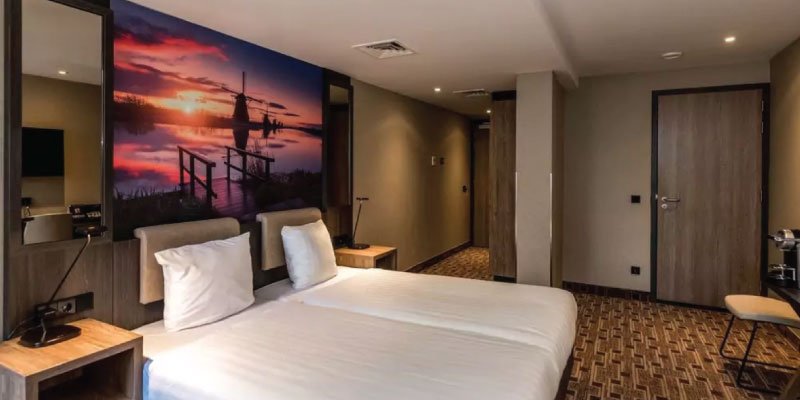
For hoteliers, the well-being and health of guests and staff are of the utmost importance. In the wake of rising hygienic concerns, what additional precautionary measures should hotels take to protect the health integrity of its environment? Here are 5 steps to enhancing hotel housekeeping in a post-pandemic world:
Before we dive in, be sure to visit our ultimate guide to elevating guest satisfaction full of tips, insights and data points on how to improve your hotel service and ensure optimal guest satisfaction.
Step 1: Assess your Current Plan of Action and Cleaning Regimen
Hospitality professionals pride themselves on high attention to detail. Proactively ensuring proper sanitation throughout the property to prevent the spread of concerning germs and viruses is no exception. Thorough planning and execution across all departments will not only maximize efficiency, but will ensure a united, connected culture during times of crisis. Periodically, leaders should assemble their team to walk the property, assess areas of concern and create an action plan for improvement. During times of lower than typical occupancy or demand, operations teams can use the opportunity to upgrade the property’s surroundings without major delays or disruptions in service. When it comes to reprioritizing the property’s needs and staff time, establish standard operating procedures (SOPs) that allow team members across departments to flag potential hazards, improve hotel cleaning regimens, track maintenance issues and utilize inspection checklists to make sure nothing gets missed.
Step 2: Consider Increasing Hotel Deep Cleaning Efforts
In the face of global health concerns, hotels may want to consider additional rigorous deep cleaning and disinfection protocols in hotel guest rooms as well as throughout the property to mitigate risks. When increasing deep cleaning efforts, consider the following:
- Determine a plan of action for deep-cleaning hotel guest rooms, meeting spaces, restaurants, the fitness center and other public areas.
- Good hotel hygiene protocols, such as implementing hand sanitizer stations and frequent cleaning of high-touch area are also important to protect from infection.
- Get the Front Desk, Housekeeping, and Engineering teams together to schedule the right action plan to avoid significant disruption to operations and room readiness.
- Educate teams about standard operating procedures and best practices for each of their departments so they are fully aware of what they need to do, and don’t have to react with haste.
- Make sure all team members are empowered to flag all areas of concern and have a common space to log the information.
This is also a good opportunity to take a second look at your hotel housekeeping checklists to identify any additional precautionary steps that may need to take place. Clearly document cleaning processes for different areas in the hotel. To ensure your exposure to microbes is properly mitigated, identify what surfaces need to be cleaned, who is responsible for each area, and specific sanitizing products to be used to clean each surface. Other product details should include the directions for use, the contact (or dwell) time and details on how to avoid cross-contamination by cleaning from clean to dirty (cleaning & maintenance management magazine).
Step 3: Consider Putting a Pause on Cleaning Opt-Out Programs
Whether for green efforts, loyalty initiatives or bottom-line saving efforts, cleaning opt-out programs have been on the rise. However, as you are reconfiguring your property’s SOPs and adjusting cleaning measures, you may also want to assess the new health risk of compromising protective efforts amid an increased risk of COVID-19.
According to a Washington Post report, in some cases of opt-out programs when hotel rooms were eventually ready to be cleaned, they were dirtier than those that were serviced daily. In fact, the time and products it took to clean a guest room almost doubled (Green Lodging News). During times of unpredictability, it is important to maximize the efficiency of staff hours to reduce labor costs and make sure resources are being allocated in the best possible way.
In addition to dirtier rooms, there can be other downsides to opting-out of daily hotel room cleaning. Having a roving team of room attendants provides several significant benefits that may otherwise go overlooked. Since housekeepers are often first to catch maintenance and security issues, it’s good to have someone checking on a hotel room every day (Washington Post).
Lastly, since hotel room cleanliness is one of the most common complaints from guests on travel review sites, the need for a well-organized cleaning process is an absolute must for every hotel. When health concerns like Coronavirus are more prevalent, guests may be on high alert when it comes to meeting their cleanliness standards.
Step 4: Open Lines of Communication
As is the case with any good crisis plan, keeping staff informed and addressing employee concerns can make a world of difference in the overall hotel guest experience. The need for increased flexibility with travel planning right now also calls for connecting with the guest even before arrival. By putting your hotel PMS and integrated automation system to work, you can communicate the status of your local surrounding area and what you’re doing to keep your property safe and clean prior to arrival.
Upon arrival, from the moment a guest enters the hotel lobby, your staff sets the tone for what’s to come. A confident, pleasant encounter with front of house will immediately put the traveler at ease. And the housekeeping department, with its scrupulous standard operating procedures, imparts guests with a restorative sensation (eHotelier). Your hotel serves as a home away from home and having an open line of communication will create a sense of connected culture from the inside out.
As is the case in any challenging times, it is also important for hotel management to be able to react quickly. Hotels are naturally fast-paced environments and having the ability to swiftly identify, communicate and act on areas of concern can be instrumental in case of an emergency.
Step 5: Maximize Your Hotel Technology
When hotels run on manual processes, they are prone to service errors and miscommunication that can cause delays and subpar conditions. The right hotel technology can be a powerful tool in the decision-making process by reaching across the entire ecosystem to orchestrate proactive tasks such as automating room assignments, schedule turnovers and reprioritizing work.
We hope that these 5 steps to enhancing hotel housekeeping in a post-pandemic world were useful for you.
With an Amadeus Service Optimization solution, you can also keep your staff in the loop about critical individual travelers needs and preferences. Drawing on data such as personalized history, source of travel and recognizing patterns in behavior, you can centralize hotel guest information to deliver the anticipatory service levels needed to exceed guest expectations. Team members have the ability to flag rooms, identify group codes and implement any precautionary deep cleaning measures as necessary. By streamlining the crucial components of your operation to improve efficiency across the board, team members can react quickly and communicate promptly with any issues they may face.
The need for efficient processes and best practice guidelines are an absolute must for every hotel. Continuously improving your property, staff and procedures. This will ultimately enhance the guest experience, improve brand reputation and inspire exceptional stays time and time again. Because after all, it’s all in the details.
In this new era of hospitality, the Amadeus Service Optimization suite of solutions—which enables hoteliers to manage housekeeping, cleanliness, maintenance, and other vital operational tasks with efficiency—are now accessible at special limited time pricing to support hospitality recovery. Click here to learn more.





![The Future of Personalization is Group Business [Infographic]](/wp-content/uploads/2019/02/The-Future-of-Personalization-is-Group-Business-Infographic-1.webp)
